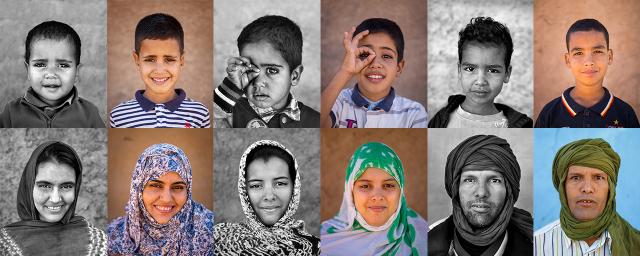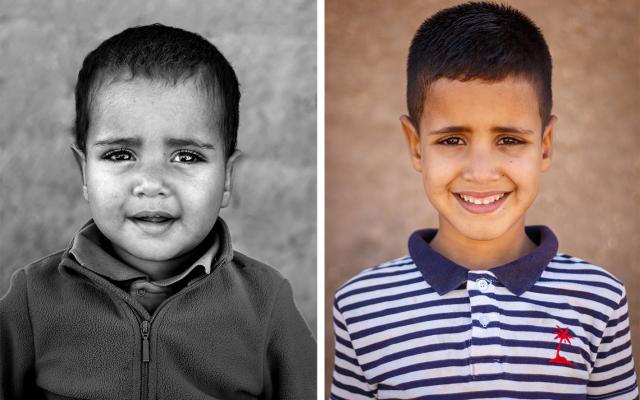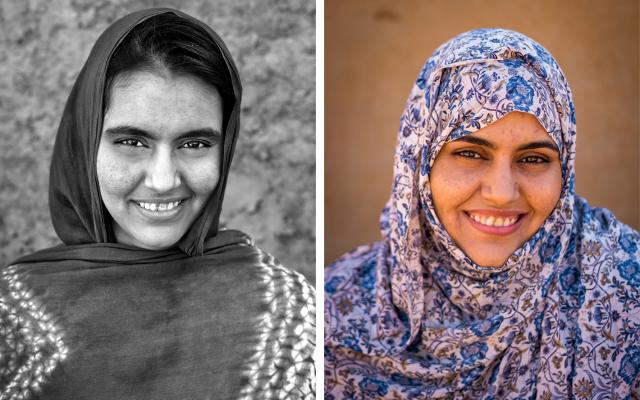
In 2015, Oxfam published the “40 faces 40 years” photo exhibition, profiling 40 Sahrawi refugees four decades after the Western Sahara conflict erupted in 1975 forcing tens of thousands to flee to neighboring Algeria, where they remain to this day. This exhibition provided an opportunity to shed a light on the lives of generations of individuals born and raised in displacement.
Five years later, little has changed – the Sahrawi refugee population is marking their 45th year in camps situated in the middle of the Algerian Sahara, where life remains incredibly difficult. Temperatures reach up to 50 degrees Celsius in summer and dip below zero degrees in winter, and most refugees remain dependent on humanitarian aid to meet their most basic needs, including access to food, water, and shelter. Throughout 2020, the COVID-19 pandemic has only further exacerbated chronic hunger and poverty in the camps.
“40 faces 40 years”, five years later
The path to a peaceful resolution of the conflict has also grown significantly more precarious in recent weeks. The collapse of the 29-year long ceasefire on 13 November and the eruption of military clashes between the Frente Polisario and Morocco presents a threat regional stability, renews fears for the security and future of Sahrawi refugees, and has greatly set back diplomatic efforts made in recent years to achieve a political solution.
As Sahrawi refugees embark upon their 46th year of displacement, Oxfam caught up with several of the individuals profiled in our “40 faces” exhibit to find out how their lives have – or have not – changed over the past five years.

Said Abdi Sidahmed (Ladiba Lehcene Ahmada), 7 years old
“Said has grown a lot in the last five years. He is beginning to study, and we are letting him and his siblings be more independent – they can go out alone to play with their friends, for example,” says Said’s mother, Ladiba Lehcene Ahmada.
“As he continues to grow, he will study well and graduate from school. I wish that he will find work that he loves to do, and that he will grow independent but continue to rely on and support his community. I truly believe that he will see an end to our displacement in his lifetime.”

Sidahmed Abdi Sidahmed, 9 years old
Said’s older brother, Sidahmed, has also grown up significantly in the past five years. “Sidahmed is the oldest of his brothers and sisters, and I can see that he has taken on this responsibility as he gets older,” Ladiba shares.
“As he gets older, he is understanding what distinguishes himself and his friends and siblings from other children around the world – the access to education, their environment and the places the play, their food and clothes. He can see that it is not the same for children elsewhere. But we try to compensate with all available means – we shower them in love, affection, and guidance. This is what is ultimately important in raising our children.”

Housain Yahdi Housain, 11
“My plays with his friends, but in the past five years he has become serious about his studies,” shares Housain’s mother Salka. “His dream is to become a doctor, and I hope for him that he will achieve it. I know this is a concrete way for him to benefit society.”
“Housain asks me all the time if we will return to the land we were displaced from. Always, I answer ‘soon.’ I hope that will become true.”

Habba Abdallah, 26
“Very little has changed in my life in the last five years. I’m still displaced, still waiting to return home. I hope that considering recent developments, the international community will act fast to help us find a solution that will achieve self-determination,” Habba shares.
“Being a refugee is difficult – the feeling of homelessness is challenging for me existentially. But practically, having little work available in the camps, and the climate that we endure are always difficult. I wish the world could feel and understand our suffering and realize that we only want to live with dignity. I wish they would pay attention.”

Dalia Jatri Mohamed, 23
“In the past five years my life has changed a lot – I’m married now and have two children. I love being a mother and taking on the responsibility of caring for a family, it has made me really happy. But I have family abroad in Barcelona, and my children have been unable to meet them because it is difficult for us to travel. I hope that one day they will benefit from the summer travel trips sponsored by Spanish citizens that I took place in when I was younger. More important than Spain, though, would be for them – and me – to first return to our homeland. The thought that my children could be born and raised in these camps, always waiting to return home just like me, is immensely sad.”

Luali Brahim, 43
“Since 2015, I have had a new child and I am continuing to take care of my family happily and with love. I am still working as a hairdresser, basically still living the same routine. Five years ago, I was teaching Spanish, but I’ve left that work to focus more on my family and my barber business. I still love to teach, though, and I help children in my neighborhood review their lessons. Many of my old students visit me at home to practice and review. But the truth is, not much has changed for us during this time.”
Photo credits:
Black and white photos from 2015: Tineke D'haese
Color photos from 2020: Adad Ammi
Your donation can change lives
Around the world, Oxfam is working every day to end poverty. But we can’t do it without you.
You can help us to save lives during a disaster, get clean water running in the most remote areas, send children, especially girls, to school and stand up for the rights of women.
Making a donation to any Oxfam today could change a life forever!